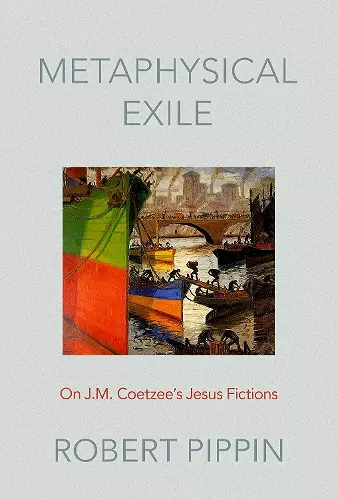Metaphysical Exile
On J.M. Coetzee's Jesus Fictions
Format:Hardback
Publisher:Oxford University Press Inc
Published:5th Oct '21
Currently unavailable, and unfortunately no date known when it will be back

Nobel Prize-winning novelist J.M. Coetzee's "Jesus" fictions constitute a trilogy of novels that have appeared over the last decade. They stand out from his earlier work in their difficulty, and in the central role they accord philosophy--in part through their interest in specific themes in which philosophy is interested, in part through their critical engagement with philosophy as a mode of intellectual activity, with a very particular role to play in the broader cultural concerns of modern Western Europe. Robert Pippin presents the first detailed interpretation of J.M. Coetzee's "Jesus" trilogy as a whole. In order to understand them, he treats the three fictions as a philosophical fable, in the tradition of Plato's Republic, More's Utopia, Rousseau's Emile, or Nietzsche's Thus Spoke Zarathustra. In the trilogy's mythical setting, everyone is an exile, removed from their homeland and transported to a strange new place, with most of their memories of their homeland erased. Pippin treats these fictions as philosophical explorations of the implications of a deeper kind of spiritual homelessness--a version that characterizes late modern life itself--and he sees the theme of forgetting as a figure for modern historical amnesia and indifference to reflection and self-knowledge. This state of exile is interpreted as metaphysical as well as geographical. Pippin's insightful, careful reading of Coetzee suggests the limitations of traditional philosophical treatments of themes like eros, beauty, social order, art, family, non-discursive forms of intelligibility, self-deception, and death. And he wrings from the trilogy its intertextuality, and many references to the Christian Bible, Plato, Cervantes, Goethe, Kleist, and Wittgenstein, among others. Throughout, Pippin expresses the potential of literature to be a profound form of philosophical reflection.
Robert Pippin's Metaphysical Exile is a quite exceptionally thought-provoking and astute account of these fictions. Beautifully articulated and deeply informed, its value first and foremost is that of a set of lucid and searching commentaries on specific details and difficulties. * Maximilian de Gaynesford, Mind *
Robert Pippin's Metaphysical Exile is a quite exceptionally thought-provoking and astute account of [the Jesus fictions]... Beautifully articulated and deeply informed, its value first and foremost is that of a set of lucid and searching commentaries on specific details and difficulties. Many of the philosophical, theological, and literary allusions which form the texture of the books and which tug constantly and often uncomfortably at the flagging memory of the reader—allusions to Plato, the Bible, Augustine, Cervantes, Kleist, Nietzsche and Wittgenstein among many others—are chased down here and cogently explained. What makes Pippin's book particularly illuminating is that he is fully alive to what flummoxed the many talented and insightful reviewers who had a go at the first of the Jesus fiction .. * Mind *
As one of Coetzee's foremost philosophical commentators, Pippin is well placed to separate the profound from the perplexing, notably by drawing on frameworks and ideas from Nietzsche, Heidegger, and Hegel. However, a key strength of his book is the way it registers the trilogy's uniquely literary engagement with its ideas.... Pippin is an adept (and accessible) surveyor, and there is no doubting the solidity of the foundations he lays out... the book is testament to Pippin not only as a thinker but as a reader of distinguished quality. * Modern Fiction Studies *
Pippin has written a concise, cogent analysis of Coetzee's recent trilogy ... Perhaps the greatest strength of Pippin's analysis is his attention to intertextuality. He finds resonance with the New Testament, Plato, Wittgenstein, Nietzsche, Goethe, Kafka, Proust, and Cervantes, among others. * E. R. Baer, CHOICE *
Coetzee's three Jesus novels have provoked much bafflement and consternation, but Pippin's lucid and probing appraisal makes a substantial contribution to our understanding of their complexities and appreciation of their importance. The book's style is clear and engaging, and in no way inaccessible to readers without a philosophical background. Pippin writes not as a philosopher who turns to literature for examples but as one who understands literature's singular contribution to the problems philosophy addresses. * Derek Attridge, University of York *
This first book on Coetzee's trilogy of Jesus novels is criticism of the finest order, criticism that creates intimacy with its subject matter, that provides genuine disclosure of a major mind still at the peak of its powers. What results is an exegetical tour de force and something like 'cosmic' philosophy (Heidegger): reflection on first and last things, on art and its value, on human passion, on what it means to be alive with true understanding of the terms of living. Pippin's wise and compelling book sets the benchmark for all future attempts to comprehend Coetzee's Jesus novels and indeed Coetzee's later fiction as a whole. * Tim Mehigan, The University of Queensland, Australia *
J.M. Coetzee's trilogy of Jesus novels is one of the more enigmatic achievements of contemporary world fiction. In a series of assured readings that are as generous to the reader as they are to the novels, Robert Pippin rises to the challenge, showing how Coetzee manages to be both disarming and philosophically profound. * David Atwell, University of York *
ISBN: 9780197565940
Dimensions: 142mm x 213mm x 18mm
Weight: 295g
152 pages